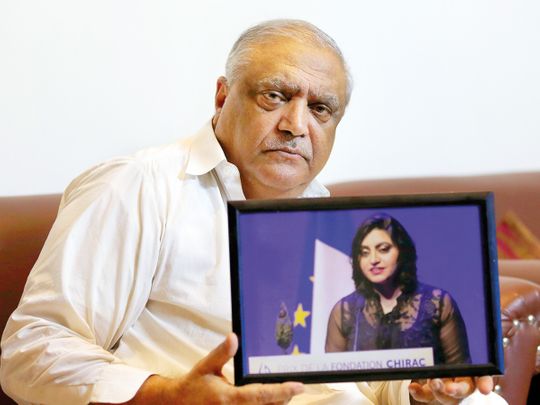
Islamabad: Pakistan on Friday confirmed it detained the father of a prominent activist who has fled the country, in an incident that's fueled fears of a clampdown on dissent and sparked condemnation from the United States.
"Prof. Mohammad Ismail has been detained by the law enforcement authorities in Peshawar in a case of cybercrime as per our laws," Foreign Ministry spokesman Mohammad Faisal said on Twitter.
"Being a citizen of Pakistan, Prof. Ismail is entitled to due process and right of defence provided in the Constitution".
Ismail had been taken away by unknown men on Thursday outside a court in Peshawar, a western city near the border with Afghanistan, according to his daughter Gulalai Ismail, a women's rights activist who fled to the United States and is seeking asylum.
Rabia Mehmood, a Pakistan researcher for Amnesty International, tweeted that he was in the custody of the cybercrime wing of the Federal Investigation Agency (FIA).
Alice Wells, US assistant secretary of state for South and Central Asia, expressed concern over "reports of the continued harassment of Gulalai Ismail's family, and her father's detention today".
She tweeted that the United States called on Pakistan to "uphold citizens' rights to peaceful assembly, expression, and due process".
On Friday, Ismail tweeted a copy of what she said was the initial investigation report showing that her father had been accused of "hate speech and false information against Government institutions of Pakistan".
FIA officials had no immediate comment. A senior Pakistani security source who spoke to AFP over WhatsApp said: "We (have) nothing to do with this."
Gulalai Ismail is an international award-winning activist who has championed the rights of Pakistani girls in a deeply patriarchal country.
She has spoken out against sexual violence and disappearances allegedly carried out by the army in northwestern Pakistan - a red line for the powerful security establishment which has run the country for much of its history.
Fearing for her life, she went on the run for four months before turning up in the United States in September.
She told AFP during an interview in Washington last month that she feared for her parents, saying they have become socially isolated, with security forces interrogating anyone who so much as texts them.
Mehmood tweeted that the couple had "continuously been harassed by the law enforcement agencies" through late night raids, surveillance and false cases.
A witness told Ismail her father "was dragged into the vehicle while being physically tortured & abused", she tweeted.
"I knew they wouldn't spare me... but I hadn't imagined them persecuting my elderly parents," she added later.
Rights watchdogs have long warned of a shrinking space for dissent in Pakistan, one of the most dangerous places in the world for activists and journalists.
They can face abductions, torture, even killings if they cross red lines that a journalism watchdog last year said had been "quietly, but effectively" set by the army.
That can include social media and online posts.
In 2016 a controversial law was passed that prohibits posts that are deemed to compromise state security or offend anything from "the glory of Islam" to non-defined notions of "decency and morality".
Activists have warned previously that it could be abused as a tool of repression.








